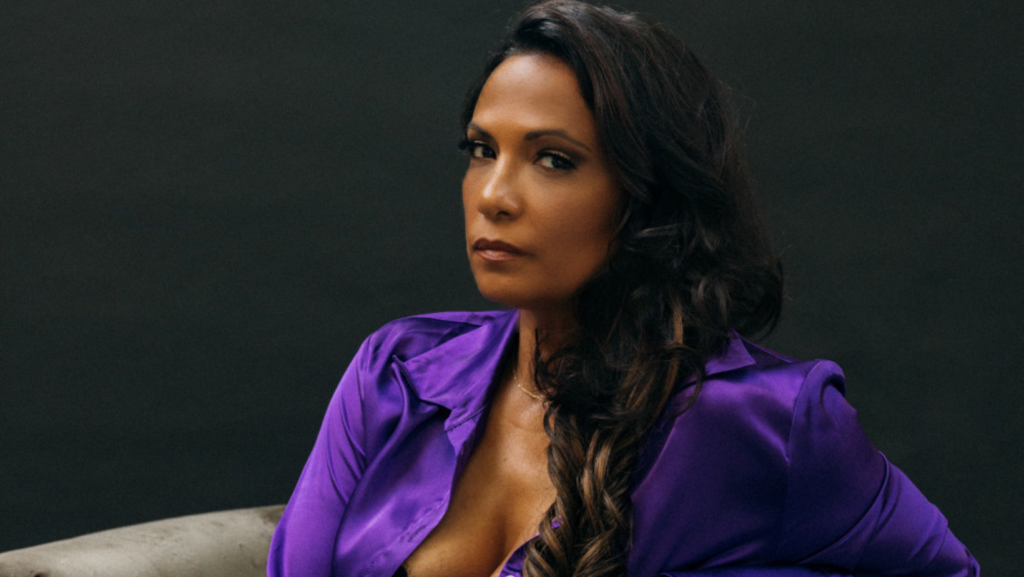The following story is part of RoyalTee’s series, Too Black to be Latin, Too Latin to be Black

In a world where representation is needed more than ever, Vergi “Vee” Rodriguez is one of many using her talents and platform to change the narrative.
As a choreographer, she spent the majority of her career behind the scenes bringing some of music’s biggest icons’ creative visions and storytelling to life, from Missy Elliott and Britney Spears to Beyoncé and Prince.
However, these days as founder and CEO of Planet V Productions, she has shifted gears as a filmmaker who is focused on telling the stories of individuals often overlooked and underrepresented in mainstream media. One of those marginalized groups includes the Afro-Latino community.
According to a report from the Annenberg Inclusion Initiative at the University of Southern California, published in November 2023, less than 5% of lead actors and actresses in Hollywood identified as Latino and less than 1% identified as Afro-Latino.
“It’s Afro-Latinos, people that look like me,” says Rodriguez who identifies as Afro-Dominican.
Self-discovery moment
The spark to create better representation and identity began as a child growing up in New York City. At a very early age, Rodriguez knew she wanted to be in the entertainment industry. She participated in the children’s theater program and Broadway plays and later attended the LaGuardia High School, the real-life inspiration of the 1980 dance movie Fame.
But despite living in the cultural melting pot of the world, Rodriguez still found herself struggling with identity.
She says, “I’ve had Black women tell me you’re Black. What’s interesting growing up, I was always taken in by black women. It was always like, you’re one of us. And so, to me I was like, I’m Black, that’s what I am. But I’m Latin too. So that’s where the Afro-Latino term comes in, and it’s been around for a long time.”
She added, “But then with other people, they’re like, No, you’re not Black, you’re Latin? And then Latin people are like, well, you’re Black, Latin. And so, for me, I’m just like, I’m both.”
There was also the Afro-Latino representation or lack of portrayed in the media that she watched.
“There were movies and stuff that will come out, like West Side Story,” she says. “The one in the 60s was great, it has this Puerto Rican cast. And there were some characters that looked like me, but even then, they put in Natalie Wood as the lead, and she was white. It was as if when they did use Latin people, they were always white-passing.”
Later when moving to Los Angeles, Rodriguez experienced firsthand Hollywood’s perception when auditioning for Latin-related roles. “A lot of the Latinos, when you walk into a room or walk into an audition, they were white-passing, you know… they didn’t look like me.”
Most of the roles she went out for were the spicy Latina stereotypical roles such as the prostitute, the drug dealers’ girlfriends or an immigrant that didn’t know how to speak English or always had a really thick accent.
“That’s where I started a transition into filmmaking where I said, you know,” she says. “How do I change this ‘narrative? What can I do to change this narrative.”
It was the moment that would jumpstart her toward her passion and purpose to create more films that challenge stereotypes and promote authentic narratives, including Afro-Latinos.
I’ve had Black women tell me you’re Black. What’s interesting growing up, I was always taken in by black women. It was always like, you’re one of us. And so, to me I was like, I’m Black, that’s what I am. But I’m Latin too.
Starting the conversation
In 2019, Rodriguez shot her first short film titled Dreamers, which has circulated to more than 80 film festivals. It tells the story of a female doctor who is a recipient of the Deferred Action for Childhood Arrivals (DACA), confrontation with an unwelcoming TSA agent, after returning from the U.S. from a medical volunteer mission. The film unravels the complexities of racism, colorism, and prejudice, components that Rodriguez says are not talked about enough in the Latin community.
“I just wanted to start a conversation about it,” she says about the film which is not available publicly just yet. “But part of it was how I was positioning myself as an Afro-Latina performer. The character had darker skin, and she was a doctor. She just was a dreamer who came to this country.”
She continued, “For me, I think it’s really important, especially now with everything that’s happening in entertainment and how the studios are just laying a bunch of people off and stuff that’s really real for a lot of us. Because I think there’s no excuse now to kind of tell our own stories.
To further inspire conversations about race and representation, Rodriguez also launched a new YouTube series titled “A Race of Your Own.” The series touches on powerful storytelling that challenges stereotypes as well as celebrates the diversity that defines our communities. “I need Latinos that look like me,” she says. “I need Black folks in this room as well. Like, why aren’t they here? So, I think it’s just expanding these conversations.”
Watch a previous conversation on Afro-Latinos here:
Get educated about who you are
As for those struggling with their own identity, Rodriguez believes that personal exploration and dialogue can open the door for greater acceptance and understanding within families.
“If somebody’s like, Well, no, I’m Latin or I’m more Black than I am more Latin that’s kind of an individual thing,” she says. “And I think as long as people are having the conversation and exploring their history and knowing where they come from, their lineage, and who their ancestors are, it opens a wider discussion and opens the doors to more of that acceptance. Yeah, we are black, yeah, that’s where we do come from. Yes, it is our lineage. Yes, let’s talk about this more.”


